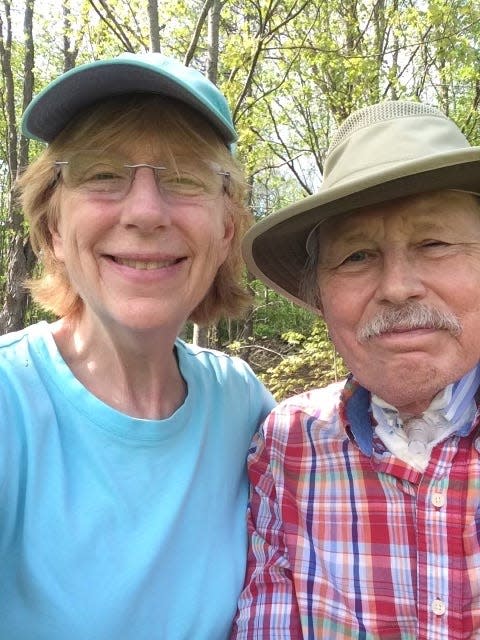NH urged to allow terminally ill to choose death: 'I want it to be peaceful'
DURHAM — The Rev. Mary James’ husband Bob wanted medical aid in dying.
James describes him as optimistic and having a "sparkle." When his cancer made him unable to eat by mouth, he dedicated himself to becoming a great cook so he could enjoy being at the table with loved ones and friends after preparing meals. But he experienced severe break-through pain and other distressing symptoms that could not be fully managed by hospice care.

“We hoped so much for a peaceful death after all Bob had been through, but it was not to be,” said James, a retired United Church of Christ minister and resident of Durham. “His death was traumatic in the extreme.”
In New Hampshire, medical aid in dying wasn’t an option for Bob, who was the Executive Director of One Sky Community Services in Portsmouth. But if House Bill 1283 passes and becomes law in 2024, it would provide an option for terminally ill people in the state in the future.
Known as the End of Life Options Act, the bill would establish a procedure for people with terminal illness to receive aid in dying through the self-administration of medicine.

The End of Life Options Act is a 'narrow, conservative bill'
Rep. Marjorie Smith, D-Durham, is the prime sponsor of HB 1283.
“It’s been an issue that I have followed for more than 20 years in the legislature,” Smith said. “It has been important to me as part of my belief that these are decisions that should be made personally without the government being involved.”
The bill establishes specific criteria for those who would qualify for medical aid in dying. The individual must be at least 18 years old and have a terminal medical condition in which they have a prognosis of less than six months left to live. The individual must also be fully able mentally to make an informed decision and physically able to self-administer the medication.
All of these qualifications must be confirmed by two health care providers who meet the qualifications set under the act. Any individual health care provider or institution may decline to assist.
Once the individual’s qualifications are doubly approved, the health care provider would be legally allowed to prescribe the appropriate medications. Then, the prescription may be filled 48 hours after qualification. Once picked up, the dying person may choose when to self-administer the medicine.
The stringent standards mean that the act would not help someone suffering from a painful, long-term degenerative disease. It also would not help anyone who was not completely mentally functioning or anyone who would not be able to physically administer the medication themselves.
“It is something that is well thought out, well balanced, very careful, and would, I think, help to complete or fill in end of life options that would be available for certain people in the state,” Smith said. “We wanted to take a very cautious, limited first step to see how it would work in New Hampshire and hope it would work as well as it has worked in other states.”
Brent Richardson, a resident of Chester and a nurse practitioner with 25 years of experience, said he believes medical aid in dying is needed as “one tool in the end-of-life-care tool box in New Hampshire."
“From a medical ethics perspective, this legislation would allow a person battling the ravages of a life-ending illness to exercise patient autonomy, and make their own decisions about the timing of their death,” Richardson said. “Another key concept in healthcare ethics is that we are compelled to provide beneficial care options to our patients. And I strongly believe that medical aid in dying is one of the most profoundly beneficial options for terminally ill patients to peacefully end unbearable pain and suffering at the end of life.”
Smith said similar bills have been filed in the legislature for the past few years, but she believes this one has a good chance to pass the House. A Democrat, Smith pointed out the bill's co-sponsors include Republicans, like Rep. Bob Lynn, R-Rockingham.
Rebecca Brown, the director of the New Hampshire Alliance for End of Life Options, said it shouldn’t be partisan issue.
“We all die,” Brown said. “I'd like to hope that, and think, believe, that everyone is trying to do the best for all of our people as well as themselves and our loved ones. And that in New Hampshire, the live free, die free attitude is to let people make the best decisions for themselves.”
Majority of New Hampshire supports medical aid in dying
Ten states and the District of Columbia allow medical aid in dying, including neighboring states Maine and Vermont.
Brown said there has been “no documented cases or evidence of anyone being coerced or pressured in any way to use this option,” since Oregon became the first state to allow it in 1994.
Last May, Vermont became the first state in the country to allow non-residents to travel to Vermont to receive medical aid in dying, as long as they meet the requirements.
Bonnie Blaisdell, from Portsmouth, said that her husband Frank Liva wanted to take advantage of Vermont’s rule after being diagnosed with terminal brain cancer. But he died before they were able to clear all the hurdles necessary for out-of-state patients.

Smith said people shouldn’t have to travel to another state. “People want to be at home,” she said.
According to a University of New Hampshire Survey Center poll conducted in October 2023, 71% of Granite Staters support legislation allowing mentally capable, terminally ill people with less than six months to live the right to end their lives using prescription medication. This includes 72% of Seacoast residents, and medical aid in dying is supported regardless of political or religious affiliation.
Susan Gillotti, 85, said she has a condition that makes this issue real for her. Right now, medical treatments are keeping the Hanover resident well. But when they fail, she wants to be able to die on her own terms.
“I want to leave in the company of loved ones. I want it to be peaceful,” she said. Her husband, who had a brain tumor, was able to choose this option when they lived in Vermont.
“He gave me and those who were with us the gift of showing how serene our dying can be. It was unlike anything we'd experienced with our parents,” Gillotti said. “I want nothing less than this for myself. And I want it in New Hampshire.”
This article originally appeared on Portsmouth Herald: NH urged to allow terminally ill to choose death with End of Life Act

